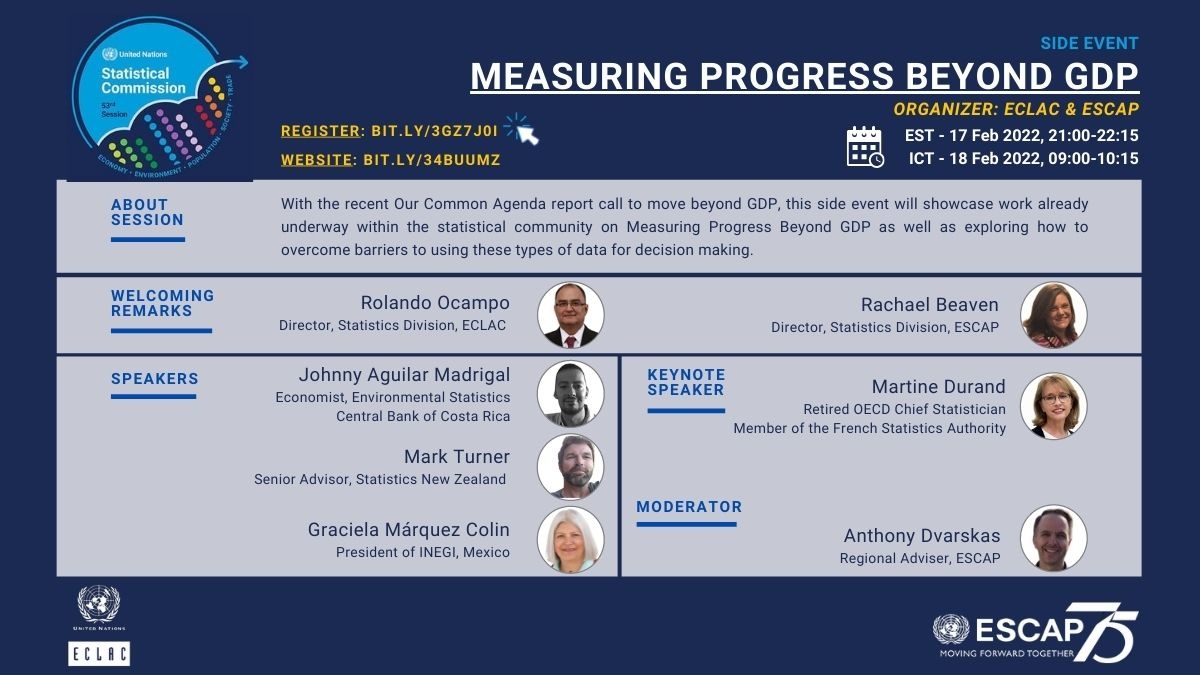Webinar - 17 February 2022, 21:00-22:30 15 EST/ 18 February 2022, 03:00-04:30 15 CET / 18 February 2022, 09:00-10:30 15 ICT
Check event time for your nearest time zone
Please register: https://bit.ly/3glBvet3Hj6P9e
Event website: https://www.unescap.org/events/2022/unsc2022-side-event-measuring-progress-beyond-gdp
Click here to join the meeting
Organizers: UNDRR and UNESCAP in collaboration with other IAEG Core Group members UNECA, UNECE, UNECLAC, UNESCWA and UNSD
ESCAP and ECLAC
Overview
Simultaneous global challenges (COVID-19, the climate, biodiversity, and pollution crises, extreme inequalities, shifting globalization dynamics, financial volatility and vulnerability, rapid digital transformation and the digital and data divides – to name a few) have ignited a broad rethinking of business-as-usual practices in evaluating the wellbeing of people and planet. In this context, the United Nations is evaluating approaches to measure progress beyond GDP. This effort will feed into follow-up processes to the 2030 Agenda for Sustainable Development and the proposed Summit of the Future to be held in conjunction with the seventy-eighth session of the General Assembly in 2023. Additionally, the knowledge will likely support ongoing related processes, in particular the multi-year update of the System of National Accounts by the Statistical Commission, to be completed by 2025.
Scope and Purpose
This side event will showcase work already underway within the statistical community on Measuring Progress Beyond GDP as well as exploring how to overcome barriers to using these types of data for decision making. Discussions from the side event will feed into deliberations under the “Beyond GDP” Sprint of agenda item 3(o) of the 53rd session of the United Nations Statistical Commission.
Presentations
| Items |
|---|
Agenda
Time | Topic | Speaker |
9:00-9:05 (5 mins) | Welcome and Overview of Agenda
| Anthony Dvarskas, Regional Adviser, Statistics Division, ESCAP |
9:05 – 9:15 (10 mins) | Opening Remarks from the ECLAC and ESCAP Regional Perspectives | Rachael Beaven, Director, Statistics Division, ESCAP Rolando Ocampo, Director, Statistics Division, ECLAC |
9:15 – 9:25 (10 mins) | Overview: Brief overview of work done by OECD and their framework with three spheres: · Production-economic performance at aggregate level · Well-being -the economic and non-economic outcomes that matter most to people · Sustainability –the capacity to generate well-being outcomes over time | Martine Durand, former OECD Chief Statistician, Member of the French Statistics Authority |
9:25-9:45 (30 mins) | Experiences Moving Beyond GDP: Country Panel Johnny Aguilar Madrigal, Economist, Central Bank, Costa Rica Mark Turner, Senior Advisor – Indicators Aotearoa, Statistics New Zealand Graciela Márquez Colin, President, INEGI, Mexico | Anthony Dvarskas, Regional Advisor, ESCAP (moderator) |
9:55 - 10:10 (15 mins) | Discussion session with panel and audience | |
10:10 – 10:15 (5 mins) | Conclusion: Final remarks and summary | Rolando Ocampo, Director, Statistics Division, ECLAC |
One of the foundations of risk-informed sustainable development is an evidence-based approach to policy and investment decisions to reach the most vulnerable. Policy makers mostly rely on official statistics, compiled and analysed with empirical rigour in all areas of governance, including disaster risk reduction. Disaster-related statistics provide the required level of quality and standard in data usage, enabling comparison across space and time, and inter-operability between data platforms.
Disaster-related Statistics have gained a strong interest from the national statistical systems for more than a decade now. The Disaster-Related Statistics Framework supported by ESCAP, Task Force on Measuring Hazardous Events and Disasters by ECE and the Latin American and Caribbean Disaster Risk Reduction Statistics Working Group by ECLAC demonstrate the strengthening of this field in statistics.
The adoption of the Sendai Framework for Disaster Risk Reduction 2015-2030 brought for the first time a monitoring framework including seven global targets and 38 indicators for monitoring of the targets. While endorsing these recommendations, the UN General Assembly recommended developing standards for disaster-related data and statistics including with engagement of national disaster risk reduction offices and national statistical offices. Building on existing work in this emerging area, the Statistical Commission at its 50th session established a mechanism to develop a common framework on disaster-related statistics. An inter-agency and expert group (IAEG) was established, terms of reference of which was approved by the Bureau of the UN Statistical Commission in 2020.
The structure of the common statistical framework on disaster-related statistics is currently under development. Moreover, the UNECE Task Force on Measuring Hazardous Events and Disasters and the IAEG organized the First Expert Forum on disaster-related statistics in June 2021. The second Expert Forum is being hosted by UNESCWA in May 2022.
Come and join!
Against this backdrop, this side event will be organized with the following objectives:
- Bring together the statistical and the disaster risk reduction communities to exchange their views on disaster-related statistics
- Share progress in development of the common framework on disaster-related statistics
- Share good practices in disaster-related statistics from the national level
- Provide a status of the reporting on international agreements through SDG and Sendai Framework monitorin
Agenda
TIME (NY time) | ACTIVITY | PRESENTER | Welcome Remarks: Introduction and Update on the IAEG process towards a common statistical framework on disaster-related statistics | Animesh Kumar Head, UNDRR Office in Bonn Co-Chair, IAEG |
09:10 – 10:10 | Panel Discussion 1. Country Experience 1: National Statistical Office 2. Country Experience 2: National DRR Organization 3. Disaster Data Disaggregation: UN Women 4. Statistical Review of Hazard Definition and Classification: UKHSA or UNECE (Time allotment for each panellist: 7 minutes plus one minute of introduction and transition time)
Open Discussion (20 mins) | Moderator: TBC |
10:10 – 10:15 | Second Expert Forum on disaster-related statistics:
| Wafa Aboul Hosn Chief of Statistics Section, ESCWA |
10:15 – 10:25 | Closing Remarks Announcements/Other information | Rikke Munk Hansen Chief, Economic and Environment Statistics Section, Statistics Division, ESCAP Co-Chair, IAEG |

